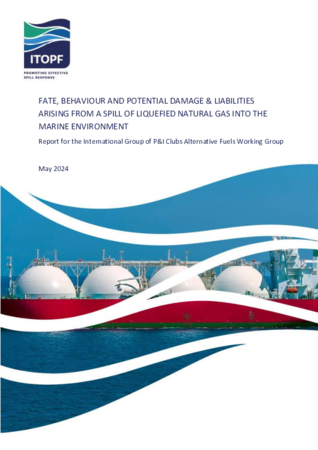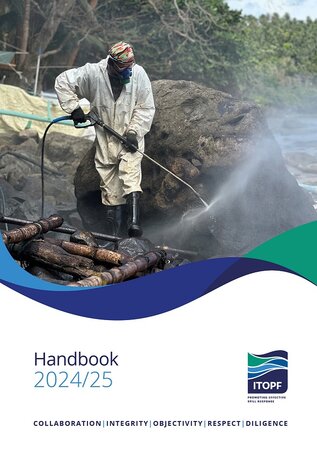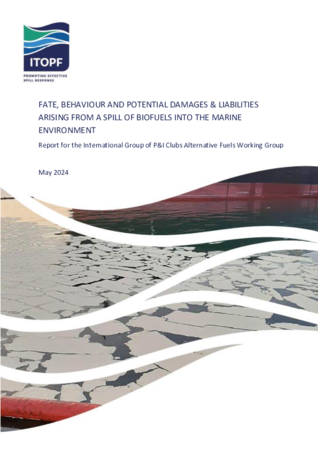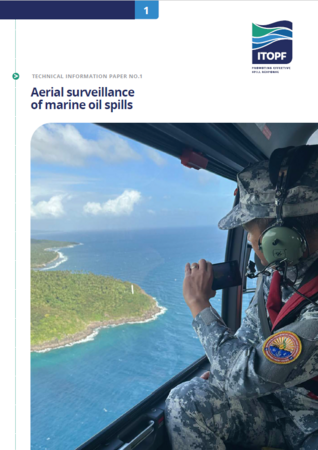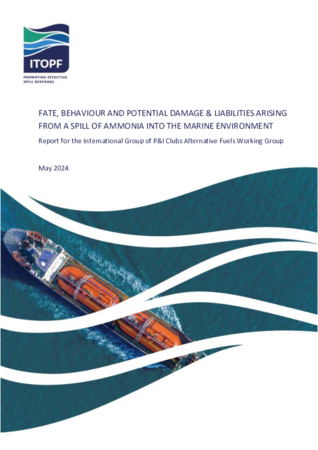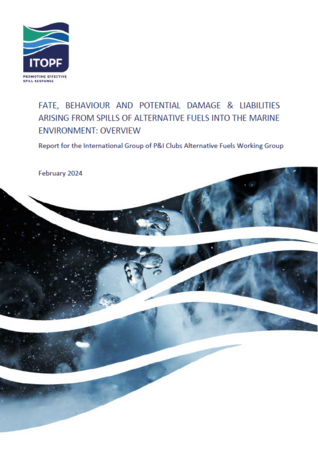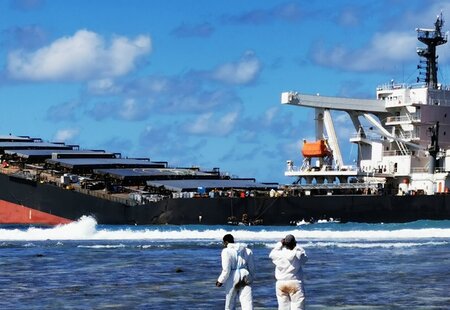Documents & Guides
Explore a variety of topics about marine spills, response and compensation matters in the pages below.
Each topic and area of interest provides access to more detailed documentation that is freely downloadable.
This includes our 18 Technical Information Papers which are fully illustrated with photos and diagrams and are available in several languages.
Alternative Fuels
What are the emerging alternative fuels and their associated risks, hazards, damages and liabilities?
Compensation for Ship-source Marine Oil Spills
What legal arrangements and sources of compensation are available for a spill from a ship?
Disposal
What planning and waste management systems need to be put in place to reduce the volume of oily waste for treatment or disposal?
HNS
What are the specific chemical response strategies for responding to a Hazardous and Noxious Substance spill, and what are the potential effects on human and marine life?
Contingency & Response Planning
What information is needed for an effective oil spill contingency plan? How can aerial observation and protective strategies assist with response operations?
Economic Effects
Which industries might suffer temporary economic losses and loss of market confidence?
Fate of Oil Spills
What happens to oil in the marine environment over time when spilled at sea? How do different factors such as volume and physical and chemical properties affect the fate of oil spills?
Explore the Resources
Fate, Behaviour, Potential Damage & Liabilities Arising from a Spill of LNG in the Marine Environment
This report focuses on Liquefied Natural Gas (LNG) as a non-traditional marine fuel. LNG has been shipped globally in bulk for more than sixty years, therefore there is experience in handling and transporting, both in tank trucks and in gas carriers. LNG is considered as a viable ‘transition’ or ‘bridging’ fuel as, when burned, it emits significantly less carbon dioxide and other harmful pollutants than persistent fuel oils. LNG has an abundant global supply, and also has established infrastructure in place for bunkering. As significant industry experience exists for this fuel type, there is a more established understanding and knowledge of material compatibility and the safety requirements necessary to reduce risks of spills/leaks in comparison to other more technically immature fuel types.
Categories: Alternative Fuels, Papers
Fate, Behaviour, Potential Damage & Liabilities Arising from a Shipping Incident Involving a Li-ion Battery Powered Vessel
This summary report focuses on Li-ion Batteries as a non-traditional method of marine propulsion. Li-ion batteries are becoming increasingly prevalent in many industries, with applications ranging from small electronic devices to electric scooters, electric vehicles (EVs) and to larger energy storage units. Li-ion batteries have been shipped in packaged form and/or as part of electric vehicles for many years. They are now a viable option for energy storage systems in the shipping industry, particularly for smaller vessels. Use of battery propulsion reduces or removes the need for traditional bunkering of traditional oils or alternate fuels i.e. ammonia, hydrogen, LNG, methanol etc.
Categories: Alternative Fuels, Papers
Fate, Behaviour, Potential Damage & Liabilities Arising from a Spill of Hydrogen in the Marine Environment
This report focuses on hydrogen as a non-traditional marine fuel, more specifically compressed hydrogen and liquid hydrogen (LH2). Hydrogen has been viewed as a viable option for shipping’s decarbonisation journey as it is one of the few alternative fuels that can be classed as ‘emission-free’ (only is the hydrogen is produced by the electrolysis of water using renewable energy, i.e. ‘green hydrogen’). The use of hydrogen as a fuel for shipping can be used in multiple states, such as liquefied or compressed hydrogen within internal combustion engines or using LH2 within fuel cells. Due to the economic and technical barriers facing hydrogen technology and infrastructure development, the industry is immature when compared to other marine alternative fuels and therefore these technologies may develop in the future, with one format potentially being more technically viable than others.
Categories: Alternative Fuels, Papers
ITOPF Handbook
First produced in 1997, the ITOPF Handbook contains a wealth of valuable information and guidance for those likely to be involved in spills of oil, chemicals and other cargo from ships.
Category: Company literature
Fate, Behaviour, Potential Damage & Liabilities Arising from a Spill of Biofuels in the Marine Environment
This report focuses on biofuels as a non-traditional marine fuel. Biofuel is a generic term used to describe fuels produced directly or indirectly from organic material, including vegetable oils, other plant materials and animal waste (but not from fossilised organic material, as with traditional fuel oils). Biofuels are seen as viable ‘transition fuels’ as, although not being zero-carbon, their upstream life cycle emission levels (also know as ‘well to tank’ emissions for fossil-derived fuels) are significantly lower than conventional hydrocarbon fuels because they are typically produced from renewable feedstocks.
Categories: Alternative Fuels, Papers
TIP 01: Aerial observation of marine oil spills
This paper presents advice and guidance on conducting effective aerial reconnaissance.
Categories: Fate of Oil Spills, Response Techniques, Planning & operations, Spill Response, Technical Information Paper (TIPS)
Fate, Behaviour, Potential Damage & Liabilities Arising from a Spill of Ammonia in the Marine Environment
This report takes a look into Ammonia as an alternative shipping fuel. Ammonia is considered to be a promising low- or zero-carbon fuel for the shipping industry, as it is easier to store than LNG or hydrogen and does not have any tank-to-wake emissions, meaning that it does not have any direct CO2 emissions when combusted on-board. However, well-to-tank emissions, upstream CO2 emissions from the production, transportation, transformation and distribution of the fuel to the vessel, vary depending on the source of hydrogen used to synthesise the ammonia.
Categories: Alternative Fuels, Papers
Overview: Fate, Behaviour and Potential Damage & Liabilities Arising from Spills of Alternative Fuels into the Marine Environment
ITOPF, as part of the International Group of P&I Clubs Alternative Fuels Working Group, has been requested to provide a series of brief summary documents to describe the expected fate and behaviours of emerging alternative fuels and to outline the possible damage and liabilities that may arise from incidents involving vessels carrying these fuels as bunkers.
Categories: Alternative Fuels, Papers
International Assistance: Sharing the Load or Muddying the Waters?
Despite a significant decline in major ship-sourced oil spills worldwide, these incidents continue to pose significant challenges for affected countries, impacting livelihoods and coastal ecosystems. Effective spill response is crucial to mitigate environmental and economic impacts, but this can be difficult to achieve during large-scale incidents, particularly where there is limited preparedness. International collaboration and assistance from governments and intergovernmental organisations can be critical to support response efforts, particularly in the early stages.
Categories: Planning & operations, Papers
Understanding culture in the context of emergencies: A step towards a more effective international spill response
Following an incident, the spill response community is subject to intense pressure where uncertainty is prevalent, yet strong work relationships are often expected to be built on an ad- hoc basis amid intense time pressure. Building trust and adaptability are therefore essential to create an environment of open communication and effective cooperation between stakeholders, leading to an effective response.
Categories: Planning & operations, Papers

